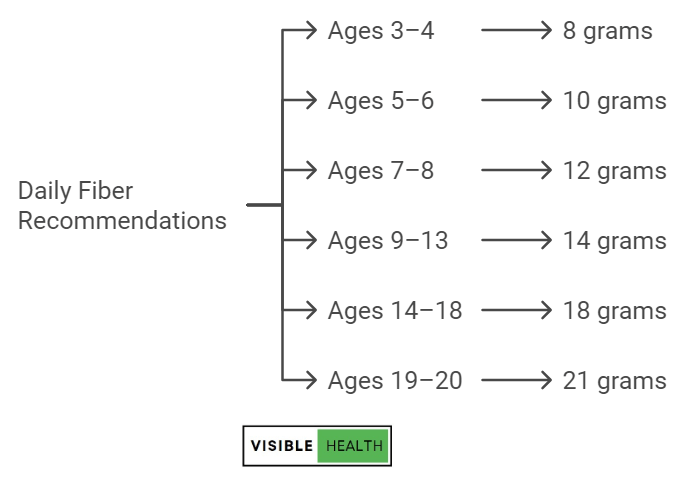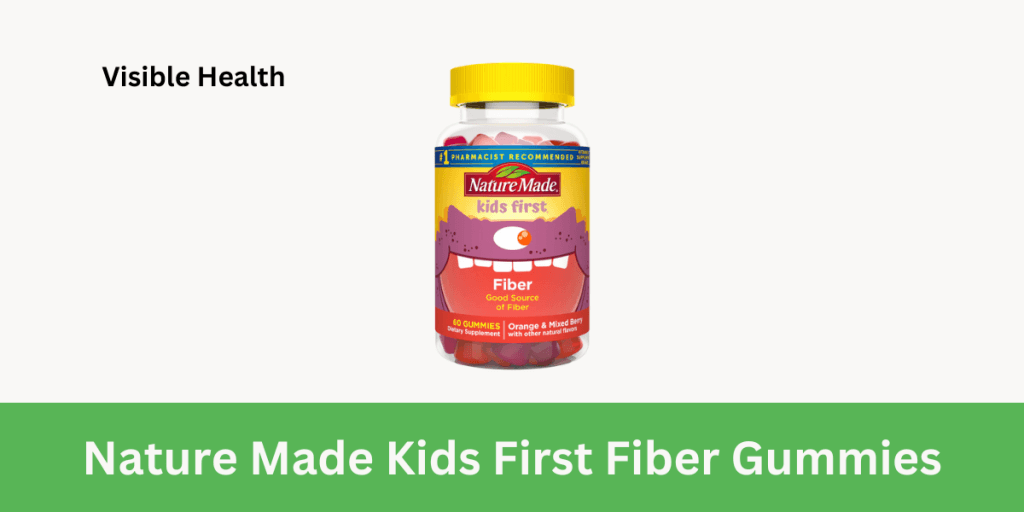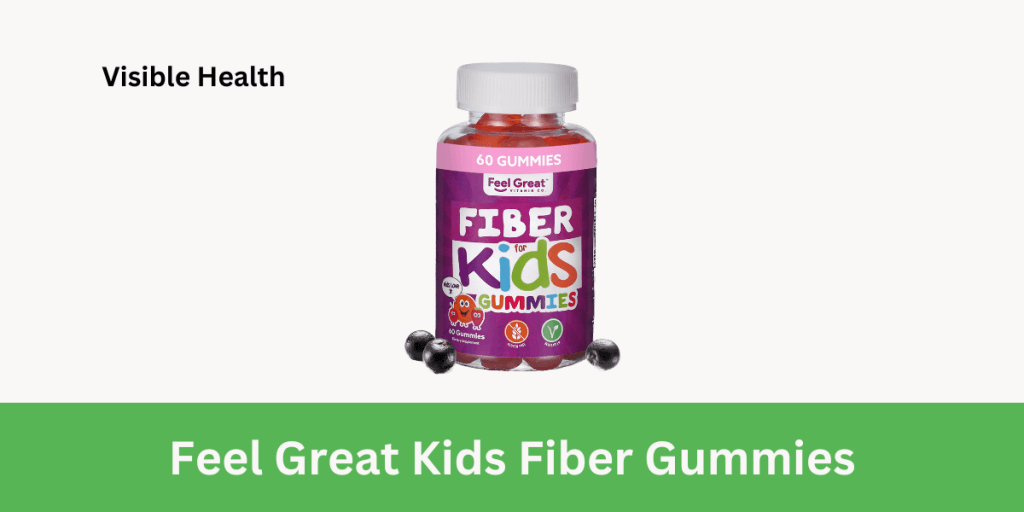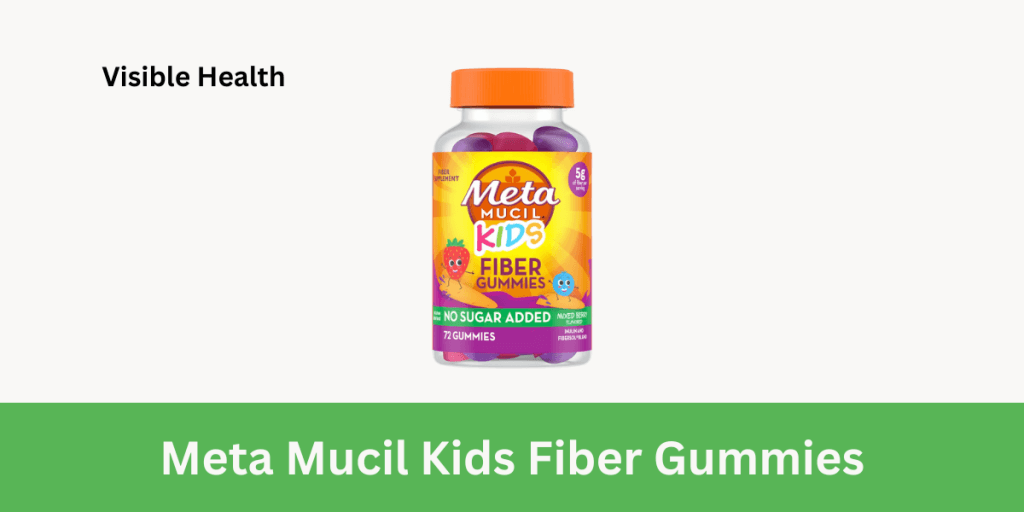Children with fiber-rich diets are more likely to enjoy healthy digestion, as fiber plays a vital role in regulating bowel movements and preventing constipation. However, many kids do not consume enough fiber through their diets, which can lead to digestive issues. To ensure they meet their fiber needs, parents often turn to fiber supplements.
Choosing the best fiber supplement for promoting healthy digestion in children requires selecting a product that meets their daily fiber needs and fits into their diet. For kids aged 4-11, products like Metamucil Kids Fiber Gummies and JoySpring Kids Fiber Gummies are popular choices, offering 5mg to 5g of fiber per serving to support regular digestion and prevent constipation. These gummies are designed to be easy to take and come in flavors that kids enjoy. Below are some top recommendations for fiber supplements that can help promote digestive health in children.
What Is the Importance of Fiber in Children’s Diets?
In children’s diets, fiber plays a vital role in supporting digestive health and preventing constipation.
Your child’s daily fiber needs vary by age: children aged 1 to 3 years require 19 grams of fiber, while those aged 4 to 8 years need 25 grams.
Insufficient fiber intake can lead to health issues like constipation, type 2 diabetes, and obesity.
What Are the Daily Fiber Recommendations?
Determining daily fiber recommendations for children can be simplified with a straightforward formula.
For children aged 3 to 18, the recommended daily fiber intake is calculated by adding 5 to their age. For example, a 5-year-old child needs 10 grams of fiber per day (5 years + 5 = 10 grams).

Understanding these fiber guidelines is vital for childhood development, as adequate fiber intake supports healthy digestion, aids in fullness, and potentially prevents heart disease and diabetes issues.
Nutrition research emphasizes the importance of including high-fiber foods in children’s diets, such as fruits, vegetables, and whole grains. Incorporating a variety of these foods can help meet dietary needs and guarantee proper fiber intake for peak health benefits.
What Are the Consequences of Insufficient Fiber?
Insufficient fiber in children’s diets can lead to a range of health issues, including constipation, which is substantially more prevalent among those with low fiber intake.
This fiber deficiency can also contribute to other gut health problems, such as irritable bowel syndrome (IBS) and diverticulitis. Additionally, fiber inadequacy can lead to a broader nutrient imbalance, potentially causing malabsorption issues.
These imbalances can increase the risk of chronic diseases like heart disease, diabetes, and certain cancers later in life. Ensuring adequate fiber consumption helps prevent these issues by promoting regular bowel movements, lowering cholesterol levels, and maintaining stable blood sugar levels.
A diverse diet rich in whole grains, fruits, and vegetables can help meet daily fiber recommendations, preserving overall health and well-being.
Aim for a balanced diet to prevent the consequences of insufficient fiber. Fiber supplements should only be considered under medical guidance to avoid potential imbalances.
What Are the Health Benefits of Fiber for Kids?
Fiber is an essential nutrient for children that offers a multitude of health benefits.
Ensuring adequate fiber intake helps maintain a healthy microbiome, which is pivotal for gut development and nutrient absorption.
Consuming a variety of fiber types, including soluble and insoluble fiber, supports regular bowel movements and prevents constipation.
A diet rich in fiber has been linked to improved weight management, lower cholesterol levels, and a reduced risk of heart disease and diabetes in children.
Fiber also plays a key role in supporting immune function by promoting the growth of beneficial gut bacteria.
To reap these benefits, aim to include a range of fiber-rich foods such as fruits, vegetables, whole grains, and beans in your child’s diet.
What Types of Fiber Supplements Are Available?
Traversing the vast array of fiber supplements for kids can be challenging, but it’s crucial to understand the different types available to make an informed decision.
When choosing a fiber supplement for your child, you encounter various formulations, including powdered supplements, gummy vitamins, and chewable tablets.
Soluble fibers are particularly effective in promoting digestive health. Listed below are the examples of soluble fibers.
- Pectin (found in Sure-Jellæ and Pacific Pectin)
- Citrucel (psyllium-free, sugar-free)
- Metamucil (psyllium husk, available in powder, capsule, or wafer form)
- Nutrisource (guar gum, often used in medical regimens)
Each type offers different dosages and uses, emphasizing the importance of consulting with a healthcare practitioner to determine the best supplement for your child’s specific needs.
This guarantees a tailored approach to supporting their digestive well-being.
What Are the Best Fiber Supplements Available for Kids?
Choosing the right fiber supplement for your child can profoundly impact their digestive health.
Products like Metamucil Kids Fiber Gummies, Feel Great Kids Prebiotic Fiber Gummies, and Nature Made Kids First Fiber Gummies are popular choices that cater specifically to children’s needs.
These supplements come in kid-friendly formats such as gummies and powders, making it easier to incorporate fiber into their daily routine.
1. Nature Made Kids First Fiber Gummies
Nature Made Kids First Fiber Gummies offer a convenient and tasty solution for children struggling to meet their daily fiber needs through diet alone.

These gummies provide a good source of fiber in a kid-friendly design with a gummy texture, making them an appealing alternative to fiber-rich snacks. Made with natural flavors and colors, they’re also gluten-free and free from artificial flavors and colors.
Each serving contains 3g of inulin fiber, supporting digestive health and promoting regular bowel movements. Designed for children aged 4-18 years, the recommended dosage is two gummies daily.
One bottle contains 60 gummies, sufficient for a month’s supply, and is priced around $14.49, not $9.99, as indicated, with a satisfaction guarantee available.
2. Feel Great Kids Prebiotic Fiber Gummies
Designed with children’s digestive well-being in mind, Feel Great Kids Prebiotic Fiber Gummies offer a convenient and tasty way to support gut health and overall wellness.

These organic, U.S.-made gummies utilize high-quality ingredients like chicory root inulin, manganese, and vitamin B6 to promote healthy tummies and foster “gut friends” that support immunity and brain function.
By incorporating fiber fun into daily routines, parents can help their kids enjoy happy memories of improved digestive health and overall wellness.
The benefits of fiber are well-documented, and these gummies are a tasty solution for kids prone to constipation.
With a no-quibble return policy and money-back guarantee, you can trust Feel Great Kids Prebiotic Fiber Gummies to deliver essential fiber benefits in a kid-friendly format.
3. Metamucil Kids Fiber Gummies
Metamucil Kids Fiber Gummies are a tasty, plant-based fiber supplement designed specifically for children, providing an easy way to increase their fiber intake without added sugar.

These gummies are crafted to be enjoyable for kids, featuring a mixed berry flavor that appeals to picky eaters. Each serving consists of three gummies, delivering 5 grams of fiber.
Metamucil Kids Fiber Gummies help improve digestive health by providing essential fiber in a fun and appealing format for children. They support regularity and overall gut health.
Children aged 4 years and older can take up to three gummies per day under adult supervision. It’s recommended to chew thoroughly and not exceed the suggested serving.
What Are Natural Sources of Fiber for Children?
You can introduce high-fiber foods into your child’s diet by incorporating toddler-friendly options such as brown rice, skin-on baked potatoes, avocados, blueberries, and various types of beans.
Parents can also sneak fiber into meals by using high-fiber ingredients in smoothies or choosing whole grain cereals and bread.
Which High-Fiber Foods Do Kids Enjoy?
Significantly, incorporating high-fiber foods into a child’s diet can be quite straightforward, especially when you know which options kids tend to enjoy.
Kiddie fruits like bananas, apples, and berries aren’t only delicious but also rich in fiber. For example, one medium banana contains 3.1 grams of fiber, and a small apple has 3.6 grams.
Fun fibers can also come from snacks like popcorn, which provides about 1 gram of fiber per cup. Whole grains like oatmeal are excellent sources, with a cup of cooked oatmeal containing about 4 grams of fiber.
Healthy habits start early, so make these sweet snacks a part of your child’s daily diet. By incorporating these fiber friends, you can help your child develop healthy digestion and a lifelong love for nutritious food.
How Can Parents Incorporate Fiber Foods into Meals?
Parents looking to boost their child’s fiber intake can start by incorporating natural sources of fiber into meals and snacks.
You can begin by planning meals around fiber-rich foods such as whole grains, fruits, and vegetables.
For breakfast, try adding high-fiber cereals, oatmeal, or whole-grain toast with avocado slices.
Incorporating fiber-friendly restaurants into your family outings can also help.
When it comes to snacks, opt for fiber-rich options like baby carrots with hummus, apple slices, or blueberries.
By making these adjustments to your child’s morning routines and overall meal planning, you can help them meet their daily fiber needs and promote healthy digestion.
This approach not only increases fiber intake but also exposes children to a variety of nutritious foods.!
How Can Parents Sneak Fiber into Meals Effectively?
Incorporating natural sources of fiber into a child’s diet requires a strategic approach, especially for picky eaters.
Meal prep can be key; try adding finely chopped veggies like spinach and carrots into pasta sauces or burgers. Sneaky servings of fiber can also come from adding bran to baked goods or sprinkling chia seeds over morning smoothies.
Fiber-rich snacks such as air-popped popcorn, fruit, and whole-grain crackers can be introduced as fun fiber buddies. High-fiber foods like beans can be added to soups and salads.
Start with small portions and gradually increase fiber intake to avoid discomfort. Use whole grains instead of refined ones, and opt for whole fruits instead of juices. By integrating these fiber sources creatively into meals, you can help your child achieve their daily fiber goals.
Affiliate Disclosure: Some of the links in this post are affiliate links, which means I may earn a small commission if you make a purchase through those links. This comes at no extra cost to you. Thank you for your support!

